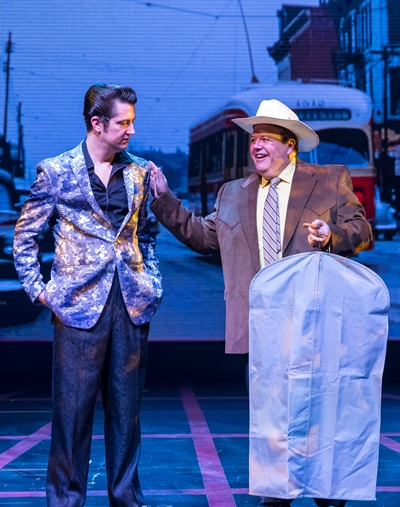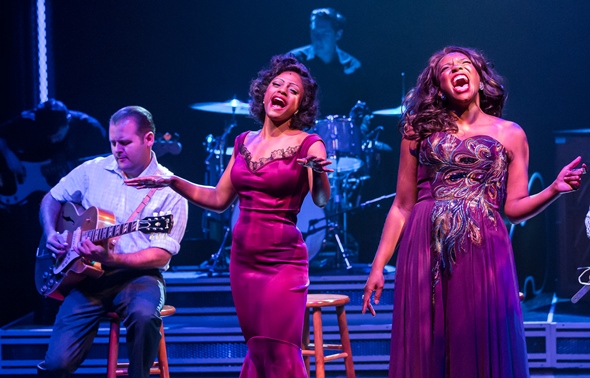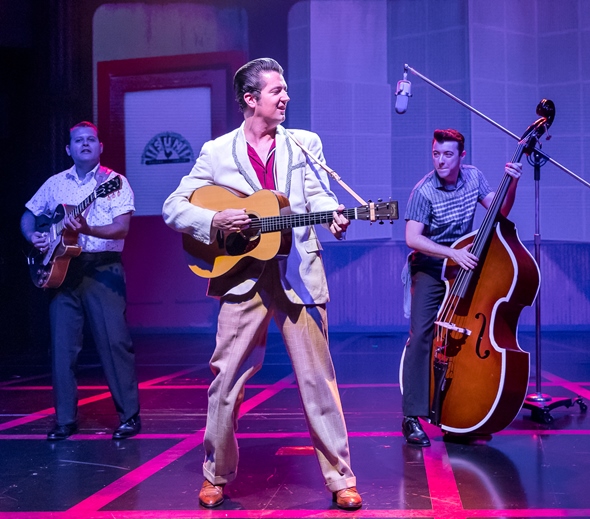‘Heartbreak Hotel’ at Broadway Playhouse: Elvis at hello, stirred but hardly all shook up
Review: “Heartbreak Hotel,” a musical written and directed by Floyd Mutrux, presented by Broadway in Chicago; extended thru Oct. 28. ★
By Lawrence B. Johnson
At age 19, an unknown Elvis Aaron Presley walked into Sam Phillips’ recording studio in Memphis and uttered the legendary words that really should be his epitaph. Asked who he sounded like, he replied: “I don’t sound like nobody.”
Neither does Eddie Clendening, star of the Elvis bio musical “Heartbreak Hotel” at the Broadway Playhouse, sound like nobody (the double negative is au courant, so it’s cool). Time may have been when Clendening’s voice resembled Elvis’ – back when he played him as part of the “Million Dollar Quartet” at Goodman Theatre in 2008. I never saw that production. But here we are, a decade later.
 Clendening looks closer to 39 than 19. His evocation of teenage Elvis, on a wild ramp-up to fame, summons an image of pop crooner Pat Boone in middle age at a cocktail party aping Elvis as he recalled him, to the delight of guests laughing and trying not to spill their drinks. Or the mellow, mature Clendening might be a chastened Johnny Cash, stolidly walking the line.
Clendening looks closer to 39 than 19. His evocation of teenage Elvis, on a wild ramp-up to fame, summons an image of pop crooner Pat Boone in middle age at a cocktail party aping Elvis as he recalled him, to the delight of guests laughing and trying not to spill their drinks. Or the mellow, mature Clendening might be a chastened Johnny Cash, stolidly walking the line.
When Clendening first walked onstage in this slow-windup enterprise, my reaction was monosyllabic: No! Then I doubled down: Really? Clendening as Elvis is a problem, but that mismatch between actor and object is just the first item on a list of let-downs.
Clendening knows the songs, word for word. But that’s only where Elvis began. Borrowing from black performers and their musical culture – “race” music as it was called – Elvis reprocessed it all through soul and body like no other white man had done. Elvis Presley was sexually electric – from the start. It wasn’t something he grew into; it’s who he was.
He also had an exceptional voice, with a surprisingly wide range, through which he expressed an instinctive, visceral convergence of music and lyrics. Clendening doesn’t have the pipes to emulate Elvis; not now anyway, not even close.
Elvis’ onstage persona was mesmerizing. Disarmingly handsome, he was fully aware of his own physical magnetism. That comes through even on film, at least in his more authentic early movies like “Jailhouse Rock” and “King Creole.” He was the complete package, a hunka-hunka burning star.
 “Heartbreak Hotel” scarcely hints at what was so special about this talented, visionary kid in the formative years 1954-57: how he thrilled the imagination of young people across the divides of race and social class.
“Heartbreak Hotel” scarcely hints at what was so special about this talented, visionary kid in the formative years 1954-57: how he thrilled the imagination of young people across the divides of race and social class.
The show’s story line is thin stuff and the dialogue so feeble and cliché-ridden that it might have been written by eighth-graders. There’s a mawkish, desperately dragged out romance between Elvis and his simpering high school sweetheart (played by Erin Burniston in a waterfall of blonde hair). Elvis’ notorious but very effective manager Colonel Tom Parker is reduced (in the person of Jerry Kernion) to a churlish font of crude one-liners.
The narrative (book) itself is weak, a check-list of historical markers from producer Sam Phillips’ (Matt McKenzie) discovery of Elvis at Sun Records and Tom Parker’s career-changing arrival on the scene to Elvis’ first appearance on the Ed Sullivan Show – watched by a staggering 54 million people – and the casting off of his buddies-cum-sidemen Scotty Moore (guitar), Bill Black (bass) and DJ Fontana (drums). This whole time-travelogue is narrated by Colte Julian as Memphis DJ Dewey Phillips.
 What’s really quite good is the supporting vocal threesome of Geno Henderson (as both Chuck Berry and Roy Brown), Katherine Lee Bourné and Takesha Meshé Kizart. Henderson actually flashes the starry stage presence that eludes Clendening’s Elvis. For shining moments that are all too brief, Henderson brings the relief of serious rock ‘n’ roll to this séance.
What’s really quite good is the supporting vocal threesome of Geno Henderson (as both Chuck Berry and Roy Brown), Katherine Lee Bourné and Takesha Meshé Kizart. Henderson actually flashes the starry stage presence that eludes Clendening’s Elvis. For shining moments that are all too brief, Henderson brings the relief of serious rock ‘n’ roll to this séance.
Everything the ambitiously produced “Heartbreak Hotel” is not can be found across town in the American Blues Theatre production of “Buddy,” a raving good-time take on Buddy Holly. On a tiny stage in a little venue. Buddy Holly may be easier to get right; Elvis was one complicated guy – present gloss notwithstanding.
Related Link:
- Performance location, dates and times: Details at TheatreInChicago.com
Tags: Colonel Tom Parker, Eddie Clendening, Erin Burniston, Geno Henderson, Jerry Kernion, Katherine Lee Bourné, Matt McKenzie, Sam Phillips


